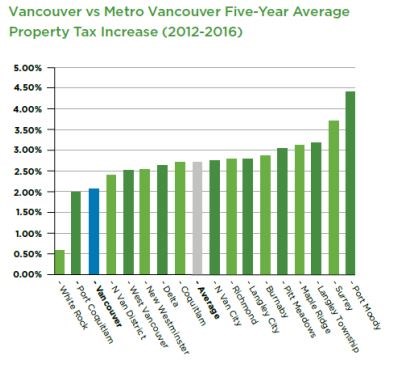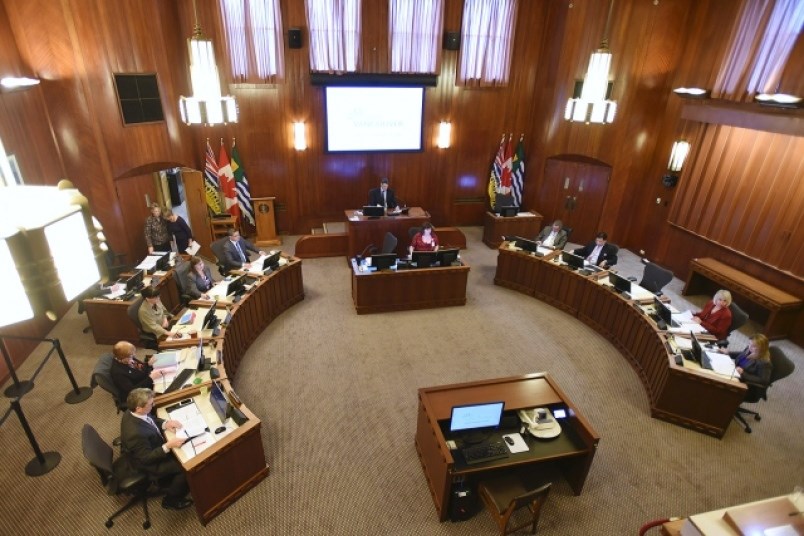A proposed property tax hike of 3.4 per cent announced by the city Wednesday will be a hard sell with Vancouver property owners recently polled on how much they would be willing to pay in taxes next year to balance a $1.3 billion operating budget.
A city staff report released Wednesday, which calls for the 3.4 per cent hike, said polling results showed 71 per cent of residential property owners and 68 per cent of business property owners favoured a one per cent tax hike over higher increases.
Only 26 per cent of residential property owners polled and 22 per cent of business property owners said they would be willing to pay a three per cent increase. The appetite for a tax hike dropped off even more at a suggestion of a four per cent hike, with only 17 per cent of homeowners and 16 per cent of business property owners willing to pay that size of an increase.
“Levels of tax tolerance remain similar to last year, with some small incremental drops in the willingness to support tax increases across taxation levels for both residents and businesses,” said the report, which doesn’t indicate how many residents and business owners were polled, although the city says it received feedback from more than 5,000 people via various surveys and open houses.
City staff also recommends a $485 million capital budget (up from $325 million in 2016), with $233.9 million for utilities and transportation projects, $80.1 million for affordable housing, $61.3 million for civic and community facilities and $47.1 million for parks, open spaces and recreation.
Whether city council will approve such a dramatic hike in property taxes is an open question, with the city report pointing out tax hikes between 2012 and 2016 have averaged two per cent. The report says Vancouver has had the third lowest property tax hike in the region, when totalling the past five years.
Only Port Coquitlam and White Rock have been lower. Port Moody, Surrey, Langley Township and Maple Ridge have all had average tax hikes of three per cent or higher between 2012 and 2016.

Council voted last year to raise taxes by 2.3 per cent to help balance a $1.2 billion operating budget. That hike was in addition to an increase in utility fees, including 4.2 per cent for water service and 9.9 per cent for sewer. Solid waste costs remained the same.
In 2017, water service fees are expected to increase by four per cent, sewer by 11.3 per cent and solid waste by 3.8 per cent. Recreation fees are slated to go up by 2.5 per cent and permit fees by two per cent.
The proposed 3.4 per cent property tax hike for next year would mean an extra $72 cost for a single-family home assessed at $1.39 million and $73 for utility fees. A business property assessed at $618,000 would see a $133 tax increase over 2016 and $70 in utility fees.
Approximately 43 per cent of residential properties in Vancouver are single-family homes and 52 per cent are strata units. The remainder are other forms of residential. The city report warns how Vancouver’s red-hot housing market could affect how much money a residential property owner pays next year.
“As the value of single-family homes has increased at a much faster pace than strata condominiums in the last five years, single-family homes have experienced a rise in property tax above the council-directed increase, while strata condominiums have experienced a reduction in property tax,” the report said. “This trend will likely reverse in the coming years as strata condominium pricing has started to escalate at a much faster pace.”
The report says two per cent of the 3.4 per cent hike would help pay for existing services while an additional 1.4 per cent would help pay for new projects and initiatives. The new operating budget calls for $22.3 million in investments, including $3.8 million for “public realm cleanliness,” $3.1 million to operate new fire trucks, $2.5 million for temporary housing, $2 million to implement the empty homes tax and $655,000 to enhance security at public buildings.
The Vancouver Police Board was expected to approve Thursday the Vancouver Police Department’s 2017 operating budget proposal that totals $271,774,905. It’s an increase of 2.3 per cent, or $6,122,730 from the 2016 budget. If approved by the board, it will be submitted to city council.
“Mindful that the city again faces a challenging 2017 budget year, the VPD’s only request for new funding was to reduce the existing level of vacancies,” said a VPD budget report. “For a number of years, the VPD has held vacancies, both sworn and civilian, because of budgetary pressures. These vacancies have negatively affected the VPD’s workload and employees. Additionally, the VPD has also experienced higher numbers of retirements than anticipated in recent years, which has led to vacancy levels higher than the agreed vacancy level.”
Council will first hear Dec. 7 from city staff on the budget proposal before voting Dec. 13. Prior to those dates, the city is hosting a public meeting Nov. 30 on the budget at the Roundhouse community centre in Yaletown. The meeting begins at 6:45 p.m.
@Howellings



